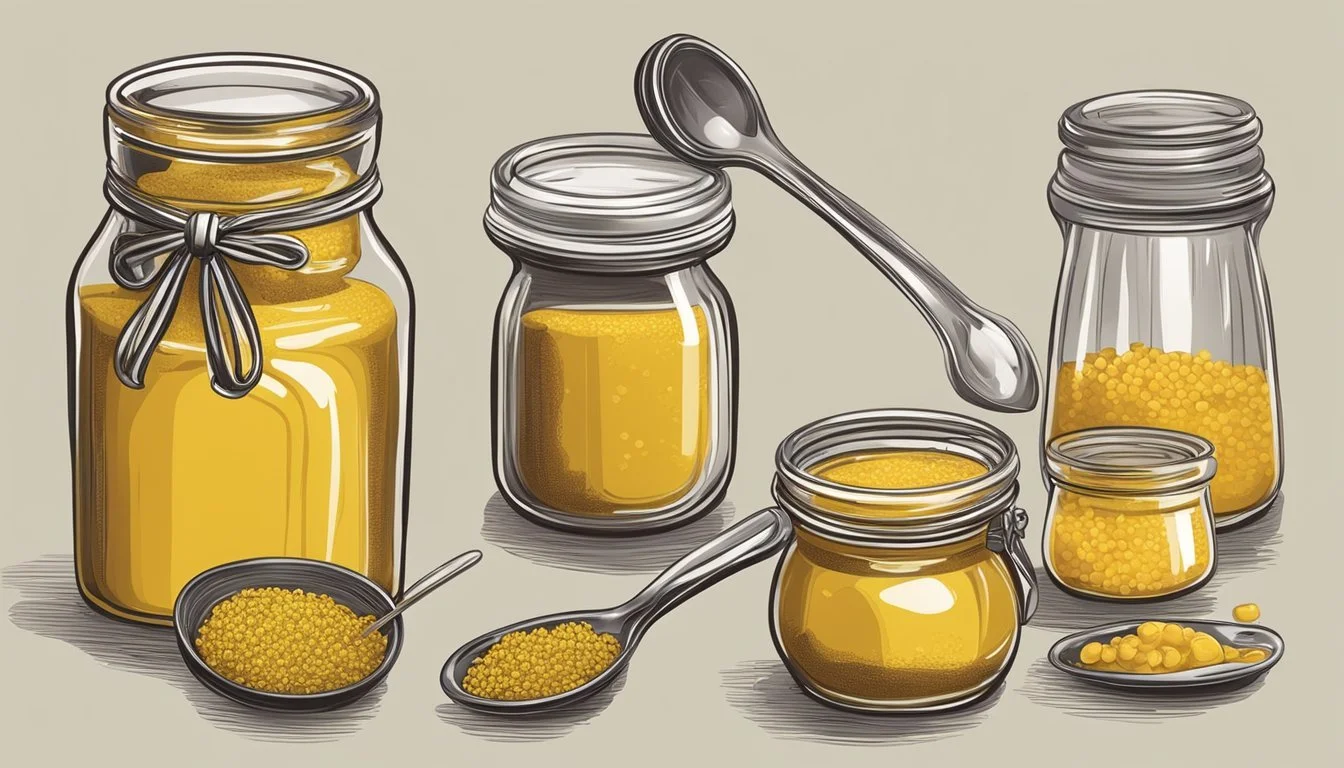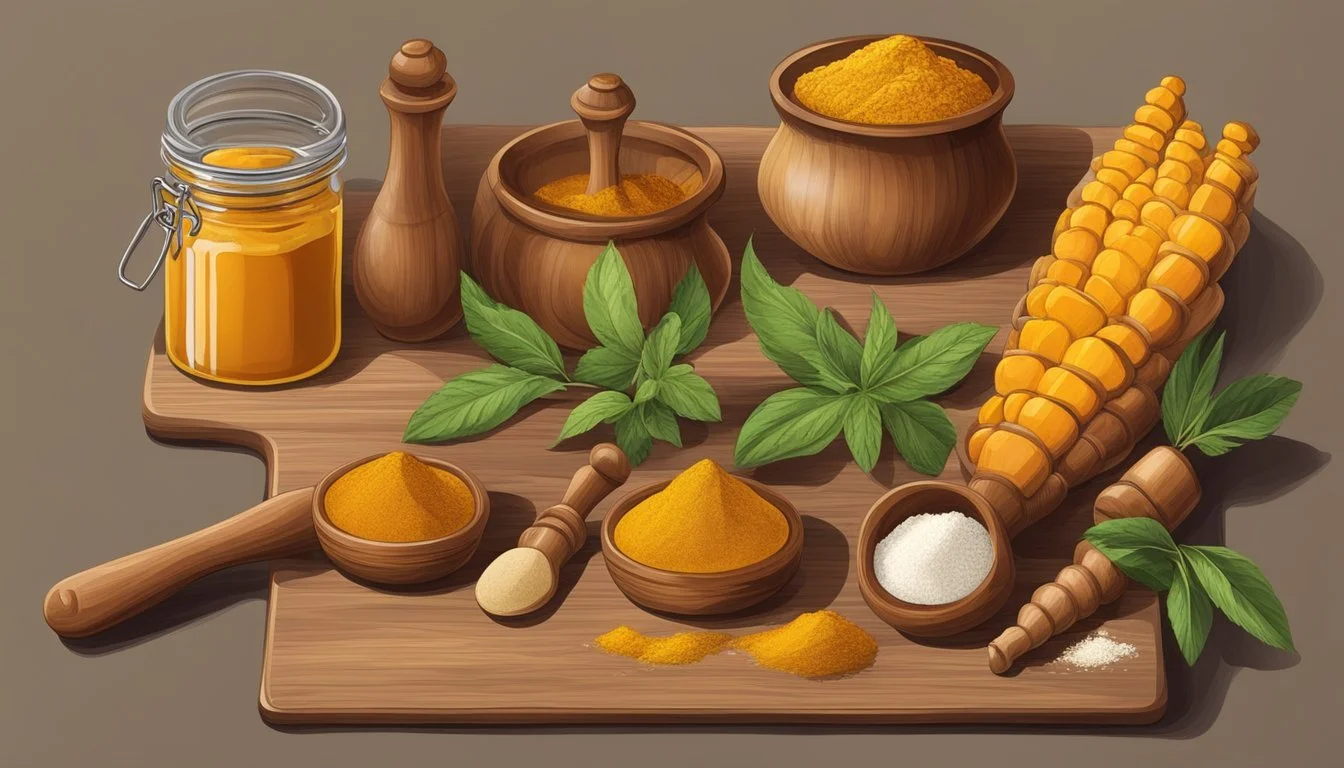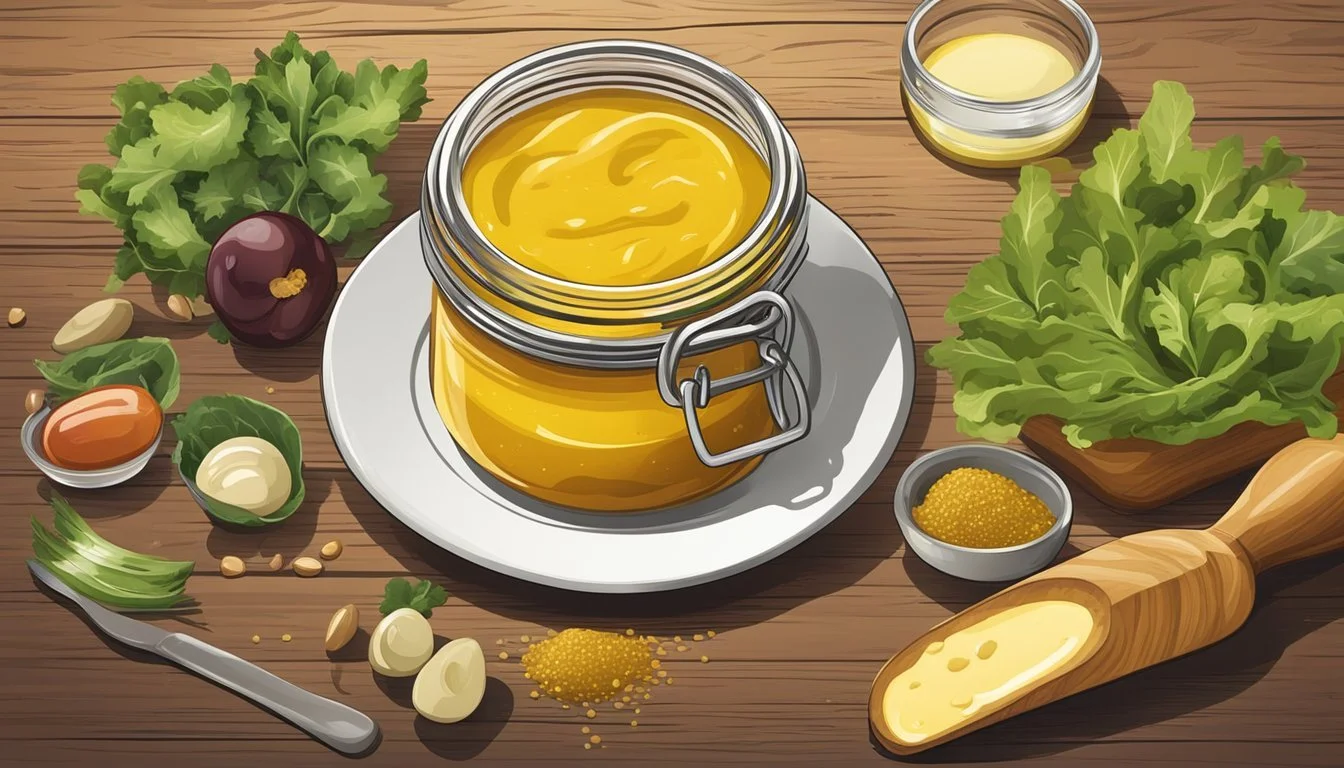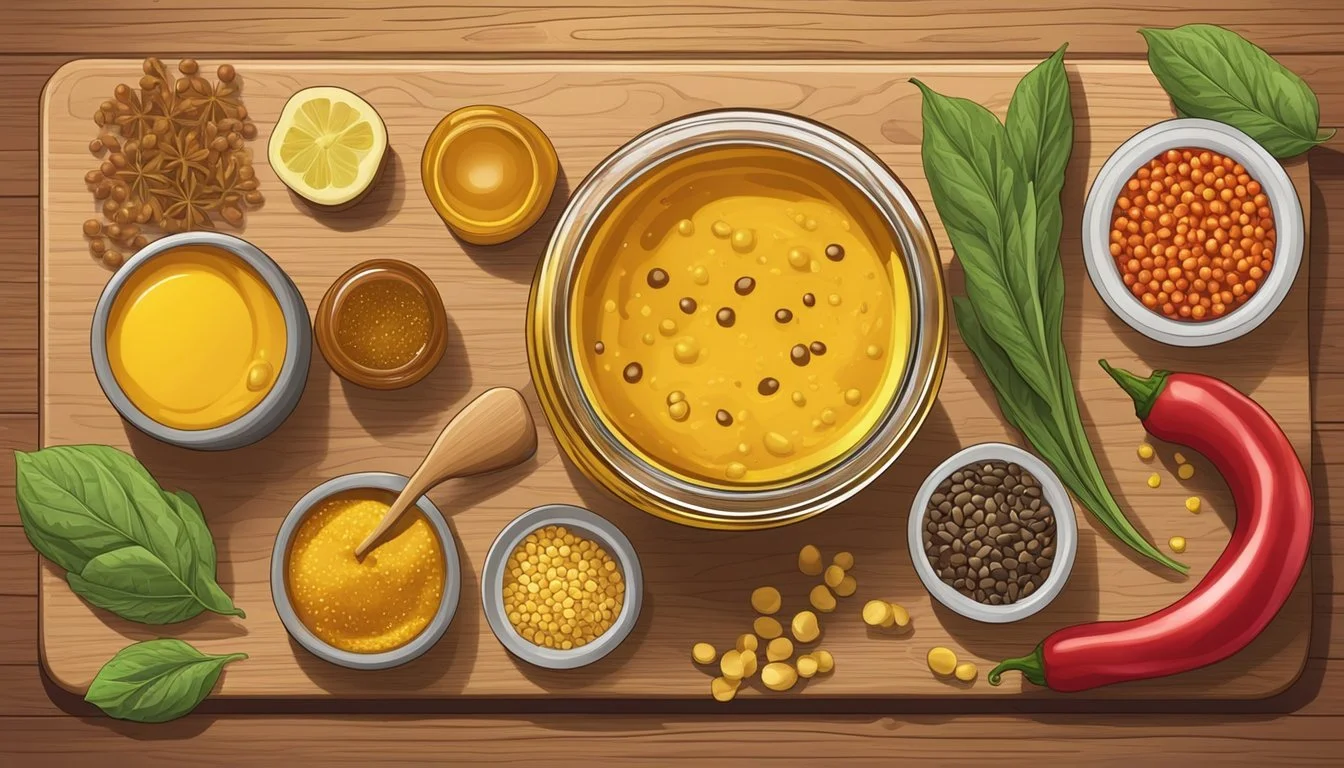Sweet Hot Mustard Substitutes
Top Alternatives for Your Recipes
Sweet hot mustard is a condiment beloved for its perfect balance of sweetness and heat, enhancing a variety of dishes from sandwiches (What wine goes well with sandwiches?) to dressings. Occasionally, home cooks and professional chefs alike may find themselves without this versatile ingredient on hand. When such a situation arises, knowing how to effectively substitute sweet hot mustard with alternative flavorings can ensure that the dish retains its intended deliciousness without missing a beat.
Finding a substitute for sweet hot mustard requires a delicate dance between sweetness and spice. The uniqueness of sweet hot mustard stems from its combination of the sharpness of mustard seeds with the hint of sugar or honey for that desirable sweetness. Alternatives must, therefore, bring a similar heat level and a complementary sweetness to harmonize with other components of the dish. Options like honey mixed with spicy brown mustard or even a pinch of dry mustard blended with sugar syrup can mimic the original's effect. These substitutes not only promise to keep the character of the dish intact but also open a gateway to new flavor profiles and culinary experimentation.
Understanding Mustard and Its Varieties
Mustard is a condiment derived from the seeds of the mustard plant, a member of the Brassica family. There are three primary types of mustard seeds: yellow, brown, and black. Yellow mustard seeds, also known as white mustard seeds, are the mildest in flavor. Brown mustard seeds offer more pungency, while black mustard seeds are known for their strong, sharp taste.
Common Mustard Varieties:
Yellow Mustard: Often bright yellow due to the addition of turmeric, this variety is mild and tangy. It's a staple in American households, frequently used on hot dogs and sandwiches.
Dijon Mustard: Originating from Dijon, France, this mustard is known for its creamy consistency and sharp, strong flavor. It is made with brown or black mustard seeds and white wine.
Spicy Brown Mustard: This type has a robust flavor profile, made with coarsely ground brown mustard seeds. It is often used in deli-style sandwiches.
Whole Grain Mustard: Retains the whole mustard seeds, providing a rustic texture and a piquant taste. It's versatile and goes well with meats and cheeses.
English Mustard: Known for its bright yellow color and intense heat, English mustard adds a powerful kick to dishes.
Honey Mustard: A sweet variant, honey mustard combines the gentle heat of mustard with the sweetness of honey, ideal for dressings and dips.
American Mustard: Typically made from yellow mustard seeds with vinegar and spices for a mild flavor, also referred to as ballpark mustard.
German Mustard: Comes in many varieties, from mild and sweet to sharp and spicy.
Mustard's flavor profile can vary from sweet and mild to hot and intense. This versatility makes it not only a condiment but also an important ingredient in many recipes. The choice of mustard seed and additional ingredients determines the mustard's heat and complexity.
Reasons for Seeking Mustard Substitutes
When it comes to cooking and dining, mustard is a versatile condiment that enhances the flavor of various dishes. Sweet hot mustard, in particular, brings a unique combination of sugar and spice to recipes. However, individuals may seek substitutes for sweet hot mustard for a variety of reasons.
Dietary Restrictions: Some consumers might have dietary limitations that prevent them from consuming certain ingredients commonly found in mustard, such as sugar, vinegar, or spices. Sweet hot mustard often contains honey, which is unsuitable for vegans, and some brands may include gluten, which is a concern for those with celiac disease or gluten sensitivity.
Allergies: Mustard is one of the recognized allergens, and individuals allergic to mustard will need to avoid it. Finding a substitute that provides a similar taste without the allergenic compounds is crucial for these individuals.
Availability: Sweet hot mustard might not be readily available in all regions or stores. In situations where this condiment is not accessible, cooks may need to find a replacement to complete a recipe.
Recipe Flexibility: Some recipes may call for sweet hot mustard, but a cook might want to experiment with different flavors or textures. Alternative ingredients can provide variation and personalization to a dish.
In search of suitable replacements for sweet hot mustard, these reasons guide cooks towards ingredients that preserve the integrity of their dishes while accommodating personal needs and preferences.
Common Mustard Substitute Options
When seeking a Sweet Hot Mustard substitute, one should consider the desired balance between convenience, flavor, and texture in the finished dish. The substitutes listed below span these essential categories, allowing one to select an alternative that best matches the original condiment's characteristics.
Convenience-Based Substitutes
For those looking for a readily available option that might already be in their pantry, mayonnaise can serve as a convenient base. It lacks the heat but provides a smooth, creamy texture.
Turmeric: Adds color similar to mustard and is easy to find in most spice racks.
Flavor-Based Substitutes
If replicating the distinct taste of Sweet Hot Mustard is the primary goal, certain ingredients can mimic its sharpness and heat.
Wasabi: A Japanese condiment with a sharp, fiery flavor similar to that of horseradish.
Prepared Horseradish: Packs a potent punch and can be mixed with a sweetener to emulate Sweet Hot Mustard's unique taste.
Horseradish Sauce: Ready-to-use and often includes additional flavoring elements, mirroring the complexity of Sweet Hot Mustard.
Texture-Based Substitutes
When the texture is a critical component of the desired culinary outcome, it's important to choose a substitute that will replicate the consistency of Sweet Hot Mustard.
Creole Mustard: Typically has a grainy texture and can provide a similar consistency with a touch of heat.
Dairy-Based Substitutes
When looking for dairy-based alternatives to sweet hot mustard, two excellent options stand out: yogurt and certain varieties of cheese. Each offers distinct flavors and textures that can mimic the creamy and tangy aspects of sweet hot mustard in different culinary applications.
Using Yogurt as a Substitute
Plain yogurt can serve as a remarkable stand-in for sweet hot mustard. Its creamy texture and tangy flavor pair well with ingredients where mustard would typically be used. For a closer approximation of sweet hot mustard's taste, one can mix in a small amount of honey and a pinch of cayenne pepper to plain yogurt. Here’s a simple ratio to consider:
1 tablespoon of plain yogurt
1 teaspoon of honey
A pinch of cayenne pepper (adjust according to heat preference)
Mix these ingredients thoroughly to achieve a balanced flavor that's both sweet and has a kick.
Cheese as a Conditional Replacement
Cheese can sometimes act as a substitute, especially in contexts where its melting properties and savory notes are desired. Soft cheeses with a creamy texture, such as cream cheese, can be blended with ingredients that impart a piquant taste to emulate sweet hot mustard's profile. For a spicy, cheesy spread, consider the following combination:
2 tablespoons of softened cream cheese
A drizzle of honey to taste
A dash of chili flakes or hot sauce for heat
This mixture should be used sparingly as it is richer and can overwhelm other flavors if used in excess. It is particularly suitable for sandwiches and can add depth to dressings when thinned out with a bit of milk or cream.
Substitutes for Cooking and Marinades
When it comes to replicating the sweetness and heat of sweet hot mustard in marinades and cooking, two primary substitute categories offer distinct advantages: vinegar-based mixtures and oil infusions. Each brings its own profile of acidity or richness that enhances the flavors in a dish.
Vinegar-Based Mixtures
Vinegar is the backbone of many marinades, offering the necessary acidity to tenderize meats and add zest to flavors. Homemade vinegar-based mixtures can approximate the tang and the punch of sweet hot mustard.
White Vinegar: This pantry staple can be sweetened with a touch of honey or sugar to balance its sharpness.
Apple Cider Vinegar: This vinegar offers a fruity tang, which pairs well with a pinch of chili flakes for heat.
Balsamic Vinegar: Its natural sweetness and bold flavor can stand in for sweet hot mustard, with a reduced need for additional sweeteners.
For each cup of sweet hot mustard needed in a marinade, the cook can use roughly three-quarters of a cup of vinegar mixed with sweet and spicy elements to taste. It’s crucial to add sweet and spicy components in increments, tasting along the way to achieve the desired balance.
Oil Infusions
Oil infusions provide a richness that can carry flavors similarly to the emulsified texture of mustard. Different oils can be used as a base for infusing flavors:
Olive Oil: A classic choice for marinades, olive oil can be combined with a mix of honey and a small amount of chili or cayenne pepper to yield a tempered version of the sweet heat.
Sesame Oil: With its intense flavor, sesame oil works well with a dash of Worcestershire sauce for a depth of flavor and a hint of heat.
Vegetable Oil: A neutral base like vegetable oil allows additions like honey and crushed pepper flakes to shine through, closely mimicking the sweet heat profile.
To create an infused oil substitute, start with one cup of oil, incorporate sweetening agents like honey to taste, and heat with spices like crushed red pepper until the flavors meld. Strain if necessary before use.
Using these substitutes, chefs can achieve a balance of sweet and spicy that adds complexity to cooking and marinades, even without sweet hot mustard.
Making Homemade Mustard Substitutes
When one runs out of sweet hot mustard, they can turn to homemade alternatives that capture similar flavors. Creating a mustard substitute at home requires basic ingredients such as water, vinegar, sugar, salt, lemon juice, and ground mustard or mustard powder.
Basic Mustard Substitute:
1 tablespoon ground mustard or mustard powder
1 teaspoon water
1 teaspoon white vinegar
A pinch of salt
A pinch of sugar
Mix the ground mustard with water until it forms a paste, then stir in the remaining ingredients until fully combined. This base provides a simple mustard-like flavor that can be enhanced with additional spices as desired.
For a Sweet Hot Flavor, one may add:
A dash of cinnamon or nutmeg
A small squirt of lemon juice for brightness
More sugar, adjusting to taste
Variations: Adding different types of vinegar can alter the flavor profile of the substitute. For instance, apple cider vinegar offers a milder tang with a fruity note and can substitute white vinegar in the mixture.
Ingredient Quantity Purpose Ground Mustard/Mustard Powder 1 tablespoon Base of substitute Water 1 teaspoon To hydrate mustard and form a paste Vinegar 1 teaspoon Adds tanginess and preserves the mixture Sugar To taste Balances the heat with sweetness Lemon Juice A few drops Brightens the substitute and adds a fresh note Salt A pinch Enhances the overall flavor and acts as a preservative
Homemade substitutes should be adjusted to the maker's preference, and they can experiment with ratios to achieve their desired level of heat and sweetness. Remember to taste as one goes, adding spices and seasonings in increments to avoid overpowering the substitute with intense flavors.
Utilizing Spices as Mustard Alternatives
In the absence of sweet hot mustard, certain spices can serve as viable substitutes, offering warmth, color, and complexity to dishes.
Single Spices
They can explore individual spices for their distinct flavor profiles and how closely they mirror mustard's characteristics. For example:
Turmeric: A bright yellow spice that provides color and a mild, earthy warmth.
Cumin: Offers a nuttier, peppery layer that can partially mimic mustard's sharpness.
Paprika: Delivers a sweet and smoky element, albeit lacking mustard's tanginess.
Black Pepper: Though not similar in flavor, freshly ground black pepper adds a compatible heat.
Spice Blends
They might consider spice blends if a single spice doesn't offer the complexity needed. Common blends include:
Curry Powder: Comprising turmeric, cumin, and other spices, it brings warmth and depth.
Ingredients in Curry Powder Note on Mustard Replacement Turmeric Adds color and warmth Cumin Imparts earthy notes Coriander Contributes subtle spice
Garam Masala: Less about heat and more about a rounded warm profile, this blend often contains black pepper.
Chili Powder: This can introduce both color and heat to a dish that requires sweet hot mustard's kick.
Substitutes in Salad Dressings and Vinaigrettes
When sweet hot mustard is out of reach, salad dressings and vinaigrettes can still shine with alternative ingredients that provide a similar tangy and spicy profile. Below are alternatives that can be incorporated into these dressings.
Vinegar: A kitchen staple, vinegar can stand in for mustard, providing the needed acidity in vinaigrettes. White vinegar or apple cider vinegar is commonly used. Begin by adding small amounts and adjust to taste to avoid overpowering your dressing.
Vinegar Type Characteristics Suggested Starting Ratio White Vinegar Clean, sharp flavor 1 teaspoon per tablespoon of mustard Apple Cider Vinegar Slightly fruity, milder than white vinegar 1 teaspoon per tablespoon of mustard
Lemon Juice: For those preferring a citrus note, lemon juice offers a fresh zing and can add a bright flavor similar to what mustard contributes. It is especially effective in lighter dressings.
Start with the juice of half a lemon in place of one tablespoon of mustard and modify as needed.
Oil: Essential in vinaigrettes, oil acts as a base and helps in emulsifying the ingredients. Although without mustard the emulsion may be less stable, the flavor can still be balanced.
Whisk the chosen substitute with oil as you would with mustard to create your dressing.
In the absence of sweet hot mustard, individuals may also explore commercially available or homemade dressings tailored to their taste preferences until they can source mustard again. Homemade recipes with alternative ingredients can provide a satisfactory replacement for the distinctive taste of sweet hot mustard in these culinary applications.
Alternatives for Mustard in Sandwiches and Burgers
When seeking substitutes for sweet hot mustard in sandwiches and burgers, one must consider taste, texture, and zest. Each alternative brings its own unique flair to the table.
Mayonnaise serves as a creamy base that pairs well with other ingredients. It provides a mild, smooth contrast to the tanginess of mustard. To replicate the sweet heat, one might add a dash of hot sauce or a pinch of cayenne pepper to the mayonnaise.
Ketchup is a common condiment that adds a sweet and tangy taste. It lacks the heat of sweet hot mustard but is a familiar flavor loved in many burgers and sandwiches. Blend it with a bit of hot sauce or chili flakes to introduce some spiciness.
Barbecue Sauce offers a smoky sweetness and could be used to achieve a similar depth of flavor. Those seeking the heat may choose a spicier variety. The substitution should be done sparingly to balance the boldness.
For those who favor a sharp, spicy kick:
Sriracha is a versatile hot sauce that delivers a garlic-infused heat. It can stand alone or be mixed with mayonnaise for a creamy spread.
Horseradish or prepared horseradish sauce can replace mustard for its similar heat profile. It should be used in small quantities to avoid overpowering the other ingredients.
Selecting Substitutes Based on Mustard Types
When seeking substitutes for sweet hot mustard, it is important to consider the specific type of mustard one aims to replace. Each type of mustard has its own flavor profile and texture, which affects the substitute choice.
Yellow Mustard Substitutes
For Yellow Mustard, which is known for its mild taste and bright color, suitable substitutes include:
Honey: A combination of honey and a dash of vinegar can mimic the sweetness and tanginess of sweet hot yellow mustard.
Mayonnaise: A neutral base that allows for additional seasonings to be added for approximating the desired taste.
Dijon Mustard Substitutes
Replacing Dijon Mustard, characterized by its creamy texture and sharp flavor, one could use:
Prepared horseradish: Only a small amount is needed due to its strong flavor.
Wasabi: Another potent substitute should be used sparingly to not overpower the dish.
Whole Grain Mustard Substitutes
Whole Grain Mustard is known for its rustic texture and robust flavor. To substitute one can:
Crushed mustard seeds: Mimicking the coarser texture, using yellow for mildness or black for a spicier kick.
Coarsely ground spices: Such as coriander or caraway, mixed with vinegar, to replicate the grainy texture.
Nutritional Considerations for Mustard Substitutes
When considering substitutes for sweet hot mustard, it is important to take into account their nutritional value and potential dietary considerations. Sweet hot mustard typically contains a mixture of mustard seeds, sweetener, and spices, providing a low-calorie option with the added benefits of antioxidants from the seeds.
Mayonnaise, often suggested as a replacement for mustard in terms of texture, is higher in calories and fat. For those monitoring their fat intake, especially saturated fat, this could be significant. On the other hand, mayonnaise offers modest amounts of vitamin E and vitamin K.
Horseradish or wasabi, considered for their similar heat, have minimal calories and can be good low-calorie options. They also offer compounds that may benefit sinus health.
Vinegars, such as white vinegar, are common acid stand-ins for mustard. Vinegar is low in calories, but does not bring the same nutritional profile, such as micronutrients, offered by mustard seeds.
Honey, when used to create a honey mustard alternative, increases the sugar and calorie content. Those with sugar restrictions, such as diabetics, should use honey sparingly.
Here is how some common sweet hot mustard substitutes compare nutritionally:
Substitute Calories Fat Sugar Notable Nutrients Mayonnaise High High Low Vit E, Vit K Horseradish Low Low Low - Wasabi Low Low Low - White Vinegar Low Low None - Honey Moderate None High Trace Minerals
When replacing sweet hot mustard, those with specific dietary requirements should evaluate these substitutes carefully to maintain nutritional balance. For example, individuals on a low-sodium diet should note that some mayonnaises and prepared condiments contain significant amounts of salt.
Conclusion
When seeking alternatives for sweet hot mustard, cooks can choose from a variety of condiments and flavorings that maintain the pungent, tangy qualities of the original ingredient. They should consider the desired balance of heat and sweetness in the dish when selecting a substitute.
For Sweetness:
Honey can be mixed with a spicier element to mimic sweet hot mustard's profile.
Maple Syrup offers a distinct, natural sweetness for a unique twist.
For Tanginess:
Vinegar-based condiments, such as Worcestershire sauce, add tang with a touch of heat.
Heat Sources:
Horseradish or wasabi, used sparingly, provide a kick. They are more intense and should be added gradually.
Hot Sauce can be used for heat, with sweetness added separately.
Milder Alternatives:
Mayonnaise, although milder, can serve as a base to which one can add heat and sweetness.
When replacing sweet hot mustard, one should start with small quantities and adjust to taste, ensuring the perfect balance for the dish. Each substitute brings its unique characteristics, and experimentation may yield delightful culinary results. The chosen substitute will depend on the cook's preferences and the particular requirements of the recipe they are following.












